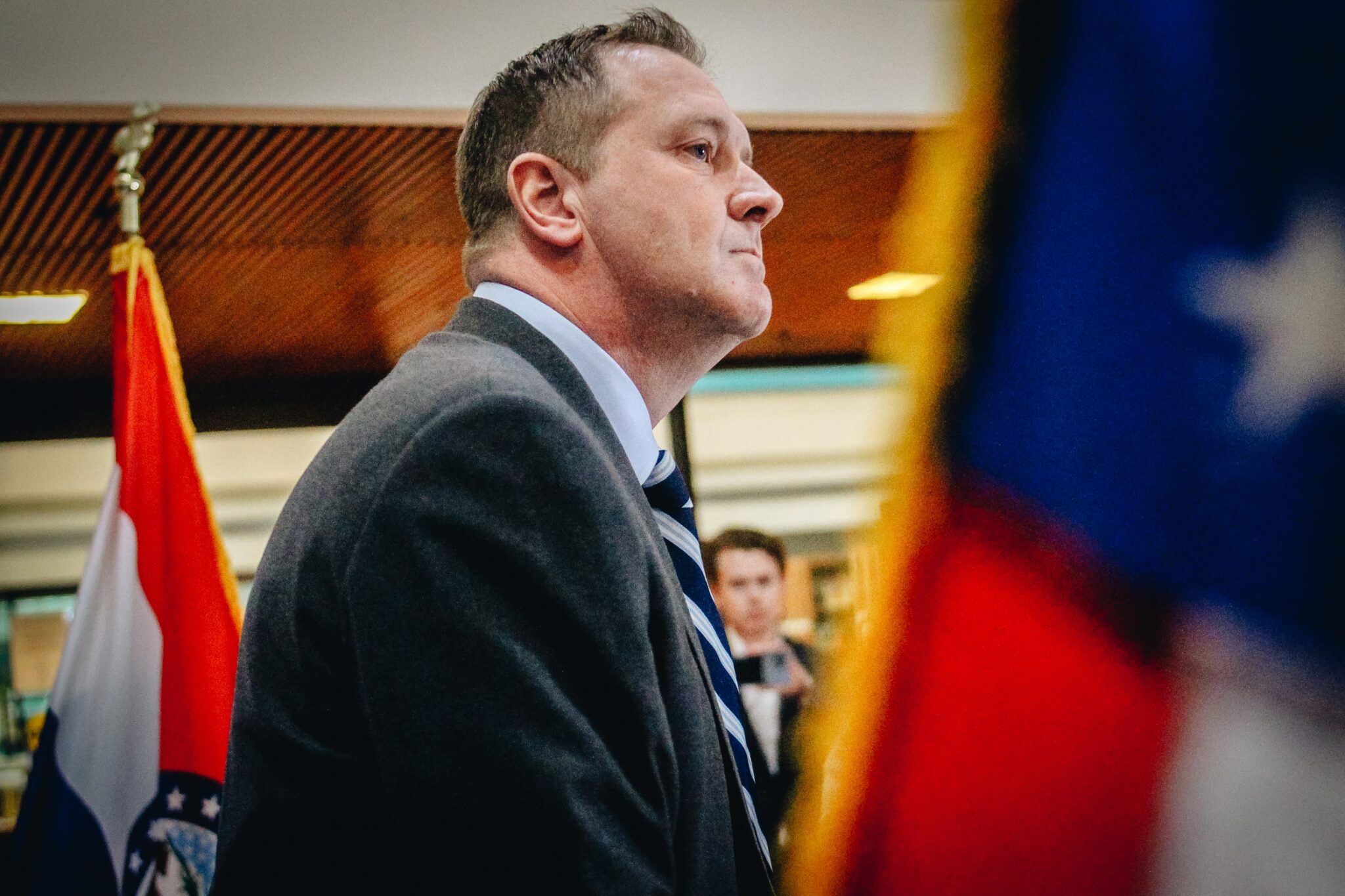Judge dismisses Missouri attorney general’s mask lawsuit against St. Charles school district

A St. Charles County Circuit Court judge dismissed Attorney General Eric Schmitt’s lawsuit Thursday against the local school district’s now-rescinded mask mandate, leaving few cases from Schmitt’s legal blitz remaining.
The City of St. Charles School District was one of 47 districts Schmitt sued earlier this year over mask mandates, and it was one of only three cases that the attorney general’s office had refused to dismiss.
Judge Daniel Pelikan on Thursday sided with the district, which had argued that since it had rescinded its masking policy the lawsuit was moot.
“Attorney General Schmitt is wasting judicial resources and public funds to continue litigation regarding a policy that the district completely rescinded,” the district wrote in an April filing to dismiss the case.
Chris Bennett, the school district’s spokesman, said from the onset of the lawsuit, it was clear that “our Board of Education has the authority invested in it by the voters of our district and state law to enact health protocols to protect our students, staff and community and this dismissal confirms that fact.”
However, Schmitt claims credit for the district changing its mask rules — even though the district’s board of education moved to drop its mask mandate in March, weeks after the lawsuit had been filed in January.
“The aim of our litigation was to put an end to mask mandates in schools,” said Chris Nuelle, Schmitt’s spokesman, “and because of our litigation, St. Charles School District has dropped its mask mandate and our litigation was successful.”
The ruling against the attorney general’s office leaves just two cases where it is still pursuing judgments against districts’ masking rules.
Like the St. Charles District, Columbia Public Schools no longer has a mask mandate in place and also has moved to dismiss the case. Arguments on the district’s motion will be heard later this month.
Last week, a St. Louis County judge heard arguments on the University City School District’s motion to dismiss Schmitt’s lawsuit against the district’s mask mandate.
Meanwhile, the Lee’s Summit School District has refused to let Schmitt dismiss the case and filed a counterclaim of its own. The district is asking a judge to declare the attorney general overstepped his authority by ordering schools to cease their masking requirements.
Fixing state law

As Schmitt has continued to pursue cases against school districts in the courts, he’s simultaneously worked with state lawmakers to change the law the wave of lawsuits was based on.
On Wednesday, Rep. Nick Schroer, R-O’Fallon, added an amendment to a Senate bill that would make clear that schools can’t require masks or face coverings for students.
Rep. Jim Murphy, R-St. Louis, said the provision was language that had been brought to lawmakers by Schmitt. Murphy sponsored legislation last year that became part of the basis for House Bill 271, which set time limits and regulations on the renewal of health orders.
In school districts’ filings opposing Schmitt’s lawsuits, they’ve argued that the definition of a “political subdivision” cited in the state law does not apply to school districts.
Schroer’s amendment would strike the statute reference that has become a point of contention — while more broadly barring districts from requiring masks.
“Obviously we need to put an end to all the ambiguity to this,” Murphy said on the House floor Wednesday, “because we don’t want our state officials suing our schools.”
Schmitt’s office declined to comment on the proposed legislative changes.
Murphy removed language that would have barred local governments and public officials from claiming sovereign immunity or official immunity if sued under the amendment’s provisions.
“‘Who would run for school board if they thought that everything they did would result in them being civilly liable for it,” Murphy said he told the attorney general’s office. “I said, ‘That’s the most ridiculous thing I’ve ever heard.’”
The provisions would also stipulate that schools cannot require students to be vaccinated against COVID-19 to attend school or extracurricular activities. It also would prohibit requirements to wear face masks or undergo COVID testing as an alternative to being vaccinated.
The amendment, Schroer said, “gets us back to letting our kids learn.”
Other provisions would also stipulate that 60 days after a health order is issued during a state of emergency that limits attendance or requires masks, only the director of the state health department would be authorized to extend the order or issue a new one — not the local governing body.
Local governing bodies could not issue orders relating to a pandemic unless the governor has directed the state health department director to authorize them to — and the state health director would be permitted to review and change those orders.
During a pandemic, only the state health director would also be permitted to close or restrict the operations of a school “or other place of public or private assembly.”
“This strips out local control,” said. Rep. Patty Lewis, D-Kansas City, who voted against the amendment.
Schroer’s amendment was ultimately adopted by a vote of 94 to 46. It was added onto a bill sponsored by Sen. Doug Beck, a St. Louis County Democrat and vocal critic of Schmitt’s legal crusade against school mask mandates.
Beck sponsored legislation this session that would have stipulated attorney’s fees be awarded to school districts if a lawsuit brought by the attorney general ends in the school district’s favor, and such fees would come out of the attorney general office’s budget.
With dozens of amendments added to his bill in the House, Beck said there will be many that will have to come off in conference committee to bring the bill back to its original purpose — which dealt with health care plans for students with epilepsy or seizure disorders.
Beck said it’s wrong for Schmitt to try to revise the law that’s been the basis for lawsuits against schools’ mask mandates.
“The AG’s time should be better suited to actually do the things that my constituents call us all the time about,” Beck said, “…instead of attacking our local kids, teachers, our local governments that are perfectly suited to make these decisions.”
Miss Clipping Out Stories to Save for Later?
Click the Purchase Story button below to order a print of this story. We will print it for you on matte photo paper to keep forever.

